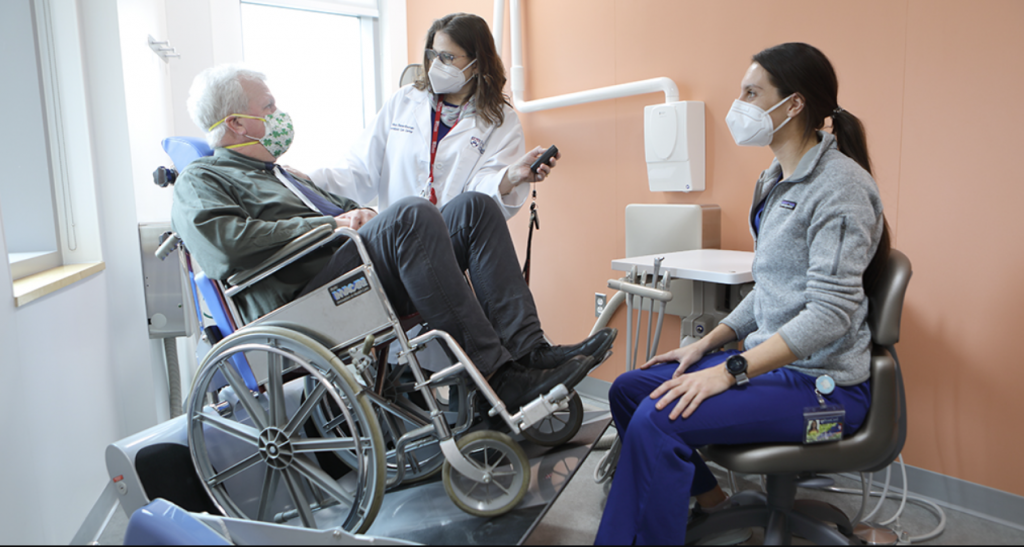Alzheimer’s disease is a progressive brain disorder causing memory loss, cognitive decline, and death that affects more than 6 million Americans today.
While its causes are not fully understood, there is a known link between Alzheimer’s and periodontal disease. The oral bacteria that cause this gum disease may make Alzheimer’s symptoms worse by increasing inflammation. It’s also thought that treating gum disease may help slow Alzheimer’s progression. With this in mind, ensuring patients get good oral care is critical. But what should you look for in a dentist for Alzheimer’s patients?
Top Questions to Ask About Dementia-friendly Dentistry

While good dental care is vital to people of all ages to ensure oral and entire body health, people with dementia like Alzheimer’s disease have an essential need for it.
In addition to memory loss, behavioral issues, and cognitive decline, Alzheimer’s patients experience many physical problems, including difficulty swallowing, chewing, speaking, and even walking, along with digestive issues and infections as the disease progresses. They become less able to recognize their oral health problems and may also forget to brush their teeth regularly, which increases the risk factors for tooth decay and other oral diseases. Therefore, choosing a dental professional who understands how these unique challenges impact their patients is critical.
The answers to the following questions can give you a good picture of the dentist’s experience caring for Alzheimer’s patients and what to expect from their dental practice:
1. Does the dentist specialize in treating Alzheimer’s? And, if so, how long have they been doing it? And how does the dentist approach dementia-related dental needs?
2. Is the dentist board-certified in geriatric dentistry? Do they have any other specialized training?
- You may also consider asking about their experience with neurological conditions such as Parkinson’s disease, multiple sclerosis, stroke, and traumatic brain injury.
3. Does the dentist work with or have access to an interdisciplinary team in case other consultations or services are needed?
4. Are they familiar with the latest research on Alzheimer’s and oral health, including medicines that cause dry mouth?
5. Will family members or caregivers be welcome during the visit?
6. What dental care do they offer?
- Is it a comprehensive list including preventative treatments, cleanings, fillings, extractions, root canal therapy, crowns, bridges, implants, dentures, and other procedures? Or will the patient need to go elsewhere for certain services, such as dental disease treatment?
7. How do the office, exam rooms, services, and staff accommodate people with special needs? Do they recognize that the patient may be confused and uncomfortable around unfamiliar people and surroundings?
8. Do they offer strategies to help with ongoing oral care outside the office? Helpful strategies could include:

- Developing oral hygiene routines with short instructions, or mirror/watch-me techniques to ensure patients’ teeth are brushed or mouth rinsed at least twice daily. And, if they’ve lost the ability to brush and rinse, explaining to caregivers how to wipe out the inside of their mouth to keep it clean.
- Learning behaviors to watch out for may signify mouth pain, such as seeing meals left uneaten.
9. How do they handle behavioral changes such as aggression or wandering during appointments?
10. How will the dentist communicate with your loved one if there are verbal-communication issues?
11. What happens after the appointment?
- Do they call you to check up on how things went?
- How do they rate a successful appointment?
12. Can they provide referrals?
13. Are they willing to work with an insurance company or accept out-of-network benefits?
Although this is an extensive list of questions, you’ll find the answers are critical for evaluating the best dentist to provide your loved one with the dental care and experience they need and deserve.
Where to Find a Dentist for Alzheimer’s Patients in Philadelphia
Penn Dental Medicine, located at the University of Pennsylvania School of Dental Medicine in Philadelphia, provides expert and affordable dental care for Alzheimer’s patients in the Personalized Care Suite at the Care Center for Persons with Disabilities.
The Personalized Care Suite was designed for special needs patients, with advanced technology, tools, and thoughtful design elements that make the visit as comfortable as possible for everyone. From patient registration through dental treatment with our expert faculty and student dentists, patients and caregivers can expect a personalized-care experience that puts their needs first.
As a dental school, we offer affordable rates to patients and accept direct payments from most dental insurance plans, including Medicaid. We can also work with you to develop payment plans as needed.
If you have a loved one who is suffering from Alzheimer’s disease, please don’t hesitate to call us at 215-898-8180 or schedule an appointment. We look forward to answering your questions, so you have peace of mind that you’re making the right decision for your loved one’s oral health care.

